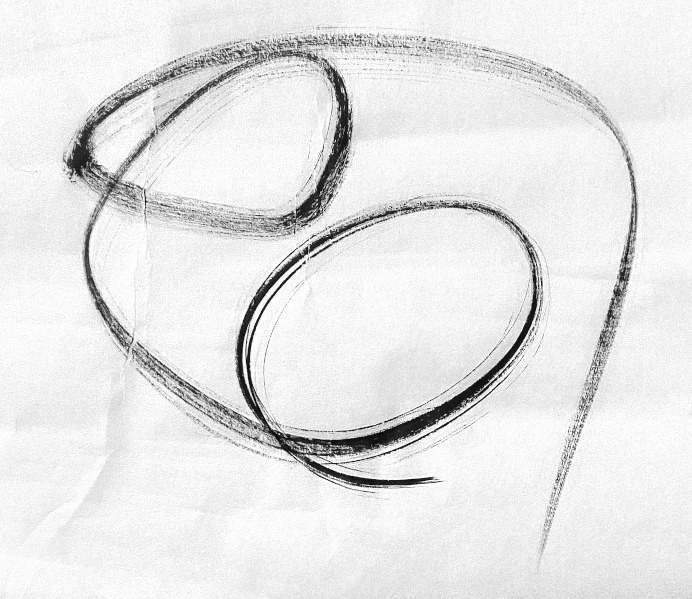What God Sees!
Children's sermon
And so John the Baptist appeared in the wilderness, preaching a baptism of repentance for the forgiveness of sins. The whole Judean countryside and all the people of Jerusalem went out to him. Confessing their sins, they were baptized by him in the Jordan River. John wore clothing made of camel’s hair, with a leather belt around his waist, and he ate locusts and wild honey. And this was his message: “After me comes the one more powerful than I, the straps of whose sandals I am not worthy to stoop down and untie. I baptize you with water, but he will baptize you with the Holy Spirit.” (vv.4-8)
NOTE: This activity should work well both in person and virtually. You might want to practice creating the squiggles a bit to have two or three examples ready to use with the children.
Objects: A collection of papers or cards with squiggles on them. Create your squiggles by just drawing random lines on paper; circles, lines, whatever, without any actual design. See the example:

Hi everyone! (Let them respond.) I have a question for you. Does anyone remember what we talked about the last time we met when we remembered the story about Messy John? (Let them respond.) Yes! Messy John was the man who dressed kind of messy, but God still picked him to be the one to tell everyone about Jesus. And Messy John was even the person who got to baptize Jesus. He was so special that today we don’t call him Messy John, but we call him John the Baptist. Pretty cool, huh? (Let them respond.)
Well, I’ve been thinking about that story and wondering how God knew that Messy John was so special. I mean, everyone else looked at John and just saw “Messy,” but God looked at him and saw something different — something special. So, I’ve been thinking about what God sees when God looks at us. And I think I figured it out. Let me show you.
(Hold up a squiggle for everyone to see.) Can anyone tell me what this is? What do you see? (Let them respond.) Well, it’s called a squiggle, because that’s all it is. I just got a pen and kind of squiggled it all over the paper. I didn’t try to make it look like anything at all, I just squiggled. So when we look at it, we might see lines, or circles, or other things, but we don’t see anything really special.
But watch this. What happens if I look at my squiggle the way God looks at us? Instead of looking at what this squiggle is, what if I look at it and wonder what it might become? (Start adding to the squiggle. Using the example above, you might add dots inside the loops for eyes, and lines for a nose, mouth, ears, and maybe more for hair.) Like, if I add a line here or a circle here, and, all of a sudden, my squiggle has turned into…what? (Let them respond.) Yes, a face!

The squiggle is still there, but instead of just looking at what it was, I started wondering what it might become. And my plain, old, un-special squiggle became this special face. Pretty cool, huh? (Let them respond.)
And you know what? I think that’s how God looks at us too. God doesn’t just look at who we are right now and what we do or what we have done. God looks at those things, sure, but what makes it better is that God also looks at who we might be, who we might become as we live our lives.
When everyone else looked at old Messy John all they saw was the mess. But when God looked at old Messy John, God saw more than the mess. God saw that Messy John could become John the Baptist. And when God looks at us, God sees more than what we see. God sees who we are, but God also sees who we can become if we follow Jesus.
You know, sometimes I think about myself and I feel kind of like one of these squiggles — like I’m not very special at all. Have you ever felt like that? (Let them respond.) Yeah, I think most of us do sometimes. Even us adults.
But I hope we can all remember the great news that no matter what we see when we look at ourselves, or when we look at the people around us, we know that God sees something way more special than we see. God sees who we can become. And even better, God sent Jesus to help us become that special person God created us to be.
Let’s say a prayer to ask God to help us remember that we are more than just a squiggle, and ask God to help us remember to let Jesus teach us how to become the person God created us to become.
Prayer:
Dear God, thank you for reminding us how much you love us, and how important it is for us to help each other become who you want us to be. Please help us find ways to let the people around us know that we love them. Amen.
NOTE: This activity should work well both in person and virtually. You might want to practice creating the squiggles a bit to have two or three examples ready to use with the children.
Objects: A collection of papers or cards with squiggles on them. Create your squiggles by just drawing random lines on paper; circles, lines, whatever, without any actual design. See the example:

Hi everyone! (Let them respond.) I have a question for you. Does anyone remember what we talked about the last time we met when we remembered the story about Messy John? (Let them respond.) Yes! Messy John was the man who dressed kind of messy, but God still picked him to be the one to tell everyone about Jesus. And Messy John was even the person who got to baptize Jesus. He was so special that today we don’t call him Messy John, but we call him John the Baptist. Pretty cool, huh? (Let them respond.)
Well, I’ve been thinking about that story and wondering how God knew that Messy John was so special. I mean, everyone else looked at John and just saw “Messy,” but God looked at him and saw something different — something special. So, I’ve been thinking about what God sees when God looks at us. And I think I figured it out. Let me show you.
(Hold up a squiggle for everyone to see.) Can anyone tell me what this is? What do you see? (Let them respond.) Well, it’s called a squiggle, because that’s all it is. I just got a pen and kind of squiggled it all over the paper. I didn’t try to make it look like anything at all, I just squiggled. So when we look at it, we might see lines, or circles, or other things, but we don’t see anything really special.
But watch this. What happens if I look at my squiggle the way God looks at us? Instead of looking at what this squiggle is, what if I look at it and wonder what it might become? (Start adding to the squiggle. Using the example above, you might add dots inside the loops for eyes, and lines for a nose, mouth, ears, and maybe more for hair.) Like, if I add a line here or a circle here, and, all of a sudden, my squiggle has turned into…what? (Let them respond.) Yes, a face!

The squiggle is still there, but instead of just looking at what it was, I started wondering what it might become. And my plain, old, un-special squiggle became this special face. Pretty cool, huh? (Let them respond.)
And you know what? I think that’s how God looks at us too. God doesn’t just look at who we are right now and what we do or what we have done. God looks at those things, sure, but what makes it better is that God also looks at who we might be, who we might become as we live our lives.
When everyone else looked at old Messy John all they saw was the mess. But when God looked at old Messy John, God saw more than the mess. God saw that Messy John could become John the Baptist. And when God looks at us, God sees more than what we see. God sees who we are, but God also sees who we can become if we follow Jesus.
You know, sometimes I think about myself and I feel kind of like one of these squiggles — like I’m not very special at all. Have you ever felt like that? (Let them respond.) Yeah, I think most of us do sometimes. Even us adults.
But I hope we can all remember the great news that no matter what we see when we look at ourselves, or when we look at the people around us, we know that God sees something way more special than we see. God sees who we can become. And even better, God sent Jesus to help us become that special person God created us to be.
Let’s say a prayer to ask God to help us remember that we are more than just a squiggle, and ask God to help us remember to let Jesus teach us how to become the person God created us to become.
Prayer:
Dear God, thank you for reminding us how much you love us, and how important it is for us to help each other become who you want us to be. Please help us find ways to let the people around us know that we love them. Amen.


